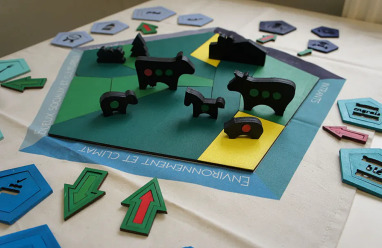The Coccinelle Innovation Hub recently participated in a workshop based around a game, La Grange®, that provided ‘a simple yet not simplistic framework’ for discussion by farmers, local citizens and scientists, and revealed the synergies and trade-offs that occur in livestock farming areas.
Animal production systems have received particular attention in the news and scientific media. However, do these considerations ever come to a real debate? Nothing is less certain. There is much attention on the negative impacts of animal production systems on the environment, and it remains difficult to have a fruitful dialogue on their desirable developments.
La Grange – promoting dialogue through simulation
La Grange conceptual model highlights animal production and its economic, social and environmental impacts, and the market and nonmarket services that animal production systems provide to society. In a recent paper in the scientific journal Animal, Ryschawy et al. proposed an integrated graphical approach that represents animal farming areas as a socioecological system, and explicitly represents the whole range of impacts and services they provide.
La Grange® was then developed as a serious game to promote dialogue among stakeholders on locally adapted transition for animal farming systems, for instance those based on agroecological principles.

Helping all participants understand key issues
La Grange® game was recently played in Coccinelle Innovation Hub in the French Massif Central, a grassland-based area of dairy and beef production, with a high potential for nature conservation. A diverse panel of 12 inhabitants of Marcenat, the village hosting an INRAE experimental farm, was invited to share their vision of what sustainable dairy farming in upland area should be. Four from these players were local farmers, while others were teachers from the local school, the deputy mayor, retired people living in the village, etc. (see Dernat et al., 2023). The two groups of players were balanced according to their professional activity, gender and age.
The game was played at two tables with six players. A researcher involved in the project and an animal worker from the experimental farm were present at each game table to bring additional knowledge if needed, but without playing directly. On one game table, players represented the whole Marcenat farming area, while on the other table they represented the innovative dairy system that is implemented on the INRAE experimental farm.
The game table representing the whole agricultural area thus highlighted the main socio-technical regime, while the other game tables focused on a niche system in this area. The game lasted 1.5 hours. One hour was needed for the complete representation of the area or of the farm, and 30 minutes were then used to agree on and represent a transition scenario at both scales. This was followed by a debriefing.
Increasing awareness and participation
The objective of this working day was to reveal citizens’ expectations and the differences in perception and information that exist between researchers and technicians from the experimental farm, farmers, and local citizens. This helped in creating a favourable dialogue between science and society.
The use of the game was relevant to offering a peaceful space for dialogue on livestock issues. Afterward, some citizens made a formal commitment to participate in Coccinelle transdisciplinary research project that brings together researchers and citizens. Two citizens have even joined the steering committee of the INRAE experimental farm.
La Grange® favours the expression of participants who have difficulties with expressing their views in collective processes, and encourages knowledge sharing among stakeholders from livestock farming areas who have contrasting and sometimes antagonistic priorities and values.
Simple games for understanding complex issues
Well-designed simulation games can be helpful in sustainability policy-making and decision support (see Vervoort et al., 2022). Low cost and low technicality games such as La Grange® correspond to the current trend of proposing simple and effective tools that promote social innovation and generate actionable knowledge.
Full list of references
Ryschawy J., Dumont B., Therond O., Donnars C., Hendrickson J, Benoit M. & Duru M., 2019. Review: An integrated graphical tool for analyzing impacts and services provided by livestock farming. Animal 13: 1760-1772 https://doi.org/10.1017/S1751731119000351
Dernat S., Dumont B. & Vollet D., 2023. La Grange®: a generic game to reveal trade-offs and synergies among stakeholders in livestock farming areas. Agricultural Systems 209: 103685 https://doi.org/10.1016/j.agsy.2023.103685
Vervoort J.M., Milkoreit M., van Beek L., Mangnus A.C., Farrell D., McGreevy S.R., Ota K., Rupprecht C.D.D., Reed J.B., Huber M., 2022. Not just playing: The politics of designing games for impact on anticipatory climate governance. Geoforum 137: 213-221 https://doi.org/10.1016/j.geoforum.2022.03.009




